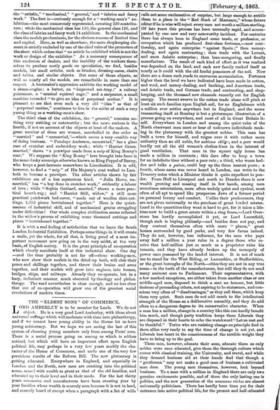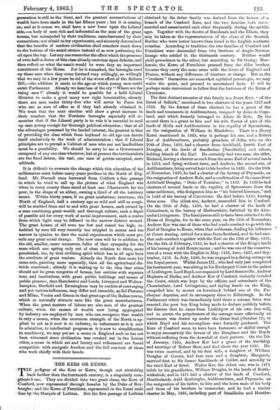THE "ELDEST SONS " OF COMMERCE.
LORD AMBERLEY is to be member for Leeds. We do not object. He is a very good Lord Amberley, with ideas about universal suffrage which will moderate with time into philanthropy, and if we cannot have young ability in the House let us have young aristocracy. But we hope we are seeing the last of this system of choosing young members only from among Peers' sons. There is a social process going on among us which is seldom noticed, but which will have an important effect upon English political life, may perhaps in a very few years modify the cha- racter of the House of Commons, and undo one of the very few pernicious results of the Reform Bill. The new plutocracy is getting educated. Everywhere in England, and especially in London and the North, new men are crushing into the political arena, armed with wealth as great as that of the old families, and educated up to their level and in their mode. For the last thirty years commerce and manufactures have been creating year by year families whose wealth is scarcely seen because it is not in land, and scarcely heard of except when a paragraph with a list of wills calls out some exclamation of surprise, but large enough to entitle them to a place in the " Red Book of Mammon," whose future editor if he is wise will reject every man not worth a million sterling. Of late years this process has been unusually rapid, and accom- panied by one new and very noteworthy incident. For centuries there has always been in England some trade, or profession, or occupation which has produced first-class fortunes,—now .cour- tiership, and again enterprise "-against Spain ;" then -money- dealing, and again contracting ; then trade with the Levant, and anon Asiatic enterprise ; then loan-mongering, and finally manufacture. The result of each kind of effort as it was realized was deposited on the land, and each new family ranked itself as nearly as it could with the old feudal possessors of the soil. Now there are a dozen such loads to enormous accumulation. Fortunes higher than the level we have indicated have been made in cotton, and wool, and money-dealing, and banking, and American trade, and Asiatic trade, and German trade, and contracting, and shop- keeping, and the thousand new channels recently cut for Falglish energy. The recent swerve in the cotton trade alone will pitch at least six such families upon English soil, for no Englishman with a million ever settles anywhere but in England, and the scene transacting itself at Bombay is but a picturesque illustration of a process going on everywhere, and most of all in Great Britain it- self. Everywhere in London and among the quiet vales of the North observant men meet or hear of unknown individuals rank- ing in• the plutocracy - with the greatest nobles. This man has built a town for himself, and reigns over it with rather more authority than an old noble, for noblesse oblige, and a peer would hardly cut all the old women's clothes-lines in the interest of good ventilation. That man in the square ugly house has made a million in contracts ; this dare offer to keep a 'town for an indefinite time without a poor-rate ; a third, who wears hod- den and talks a patois, could buy up the three nearest peers ; a fourth, whose name was never heard in London, can write to the Treasury notes which a Minister thinks it quite expedient to pon- der. From Hull to Liverpool and north to Dundee there is new wealth growing and massing itself in few hands, among men sometimes ostentatious, more often unduly quiet and cynical, most often of all apt to spend like prosperous. Jews of a former period on personal luxury and comfort. Unlike their predecessors, they are not given universally to the purchase of great 1-inde3 estates. Land in the quantities they want is hard to get, for it takes a life- time now to build a great estate within a ring fence,—Lord Over- stone has hardly accomplished it yet, or Lord Leconfield, though each is baying pitilessly—and besides does not pay, and they content themselves often with mere " places," great houses surrounded by good parks, and very few farms indeed. They do not, however, lose influence, for the man who pays away half a million a year rules in a degree those who re- ceive that half-million just as much as a proprietor rules his tenants, and they have already broken up the monopoly of power once possessed by the landed interest. It is not of much use to stand for the West Riding, or Lancashire, or Staffordshire, or the great boroughs of the North—cities they are net in any true sense—in the teeth of the manufacturers, but still they do not send many eminent men to Parliament. Their representatives, with a few marked exceptions, are either taken from another class or are middle-aged men, disposed to think a seat an honour, but little desirous of persuading others, not aspiring to be statesmen, and con- scious very often of " disadvantages," as they call them, which keep them very quiet. Such men do not add much to the intellectual strength of the House as a deliberative assembly, and they do add often to a dangerous degree to its conservative character. When a man has a million, change in a country like this can hardly benefit him much, and though party tradition keeps them Liberals they are disposed in their hearts to echo the:watchword "Let us rest and be thankful." Tories who are resisting change on principle find in them allies very ready to say the time of change is not yet, and Liberals lose heart in the consciousness of the terrible weight they have to bring up to the goal.
These men, however, educate their -sons, educate them as only nobles were once educated, give them the thorough culture which comes with classical training, the University, and travel, and while they demand business aid at their hands find that though a " gentleman" may not make a good man of business a cultivated man does. The young men themselves, however, look beyond business. To a man with a million in England...there are only two genuine excitements possible, and of them the only lasting one is politics, and the new generation of the nouveaux riches are almost universally politicians. There has hardly been time yet for their entrance into active political life, for the present and half-educated generation is still to the front, and the greatest accumulations of wealth have,been made in the last fifteen years ; but it is coming on, and as it comes we shall have a new force upon the Liberal side,-.41 body of men rich and infiuentiaLas the sons of the great houses, but . unimpeded by their traditions, unembarrassed by their connections, not -afraid to try experiments,. and -sincerely determined that the benefits of modern civilization shall somehow reach down, to the bottom of the-social stream instead of as now perfuming the oil upon the top. Letany oneremember the effect which the presence
of even half-a-dozen of this class already exercises upon debates, and then reflect on what the result-would be were they an important constituent of the House. For be it remarked, the boroughs send up these men when they come forward very willingly, so willingly that we may in :a few years be rid of the worst effect of the Reform Bill,—the addition it made to the age at which young men could -enter Parliament. Already, we heatless of the cry " Where are the rising men 1" already it :would be possible for a bold Liberal Minister to make a good many new right honourables, already there are men under thirty-five who will never be Peers but -who are as sure of office as if they had already obtained it. We trust that the next election will show a great increase in . their number, that the Northern boroughs especially will -re- member that if the Liberal party is to rule it is essential send up men young enough for thorough political education ; that of all the advantages possessed by the landed interest, the greatest is that of providing the class which from boyhood to old age can devote . itself exclusively to the work of administration ; that if Liberal principles are to prevail a Cabinet of men who are not landholders must be :a possibility. We should be sorry to •see a Government composed of any one class whatever, but at present the territorialists are the fixed datum, the rest, .one man of genius excepted, mere addenda.
It is difficult to overrate the change which this education of the millionaires-mast before many years produce in the North of Eng- land. Mr. Disraeli once borrowed from Cobbett a fine passage in which he tried to call up the picture of what England was when in every county- there stood at least one Chatsworth for the poor, in the -shape of an abbey, owning, a third of all the territory round. Within thirty -years,11 no great misfortune intervene, the 'orth of fEngland, half a century ago so wild and still so rough, will be studded from end to end with great houses, each owned by a man combining great wealth and thorough culture, each a depot of possible aid for every work of social improvement, each a centre from which light may be diffused in the narrow district around. The great -houses of old were too few . and raised too high, in- habited by men till very recently too crippled in means and too narrow in opinion to dare the social experiments which must pre- cede-any great social change. The new ones will be in addition to the old, smaller, more numerous, fuller of that sympathy for the mass which can spring only out of close relation to them, more penetrated, too, by that-civilizing spirit which has in all ages been the attribute of great traders. Already the North does more for some arts, painting more especially, than all the agricultural dis- tricts- combined ; already it is waking-up -to the idea that cities should not be great congeries of houses, bat entities with separate -tone and institutions, with great public buildings and means of public pleasure, that Manchester and Leeds, Liverpool and Wolver hampton, Sheffield and Birmingham may be centres of converging and. yet various influences, may differ and resemble, as did Florence and Milan, Venice and Genoa in that great-age of the Italian towns, which so naturally attracts .men like the great manufacturers. When the groat masters -of labour are also men of the greatest culture, when the masses of wealth now 'being aggregated by industry are employed by men who can recognize that wealth is only a means, when the enormous strength of the North is ap- plied to art as it now is to industry, to refinement as it is now to education, to intellectual progress as it is now to simplification in machinery, we may yet see a scene in England such as has not been witnessed since civilization was crushed out in the Ionian cities, a scene in which art and luxury and refinement are found compatible with energetic freedom and the full con tent of those who work chiefly with their hands.































 Previous page
Previous page